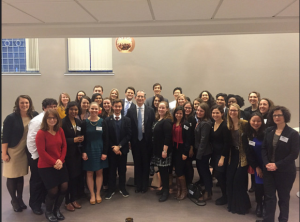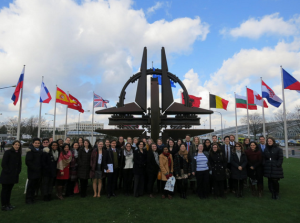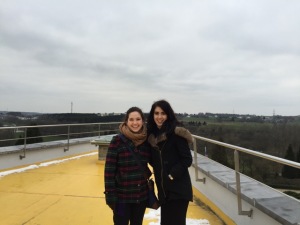 From the moment of our acceptance into Fulbright, we have continued to hear the phrase “mutual understanding.” In theory, that represents the sort of cross-cultural exchange that our program extolls. But mid-way through our Fulbright year, I began to wonder what that actually meant in practice. This past February, I had the opportunity to get a taste of the “Fulbright catchphrase” by attending the Fulbright Seminar on the European Union and NATO. Over the course of five days and two countries with Fulbrighters representing twenty-three nations, we learned how the twenty-eight member states of the EU work together and how we might do the same.
From the moment of our acceptance into Fulbright, we have continued to hear the phrase “mutual understanding.” In theory, that represents the sort of cross-cultural exchange that our program extolls. But mid-way through our Fulbright year, I began to wonder what that actually meant in practice. This past February, I had the opportunity to get a taste of the “Fulbright catchphrase” by attending the Fulbright Seminar on the European Union and NATO. Over the course of five days and two countries with Fulbrighters representing twenty-three nations, we learned how the twenty-eight member states of the EU work together and how we might do the same.
We began in the tiny nation of Luxembourg, a country that despite its small size boasts itself as a founding member of both the EU and NATO. After a brief but beautiful walking tour of the historic city, we were hosted by the U.S. Ambassador to Luxembourg. After talks by various staff members, including the acting Ambassador and Foreign Service officers, we were able to socialize with Fulbright alumni and diplomats. Even in those first few hours of the trip, I was already engaged in dialogue about current events like discussions of Britain’s exit from the European Union and the effects of the refugee crisis on Greece.
Not only did the delegates impress me with their compelling personal insights, but also I was thoroughly engaged by the knowledge of the current Fulbright class. The Seminar was my first interaction with the Schuman Scholars, a small group of Fulbrighters that spend their grant period in multiple EU countries. As someone very involved in American politics but less well-versed in international policy, these Scholars guided debates that were both informative and eye opening.
The second day got off to a quick start – a hint of how fast-paced the entire trip would be! We began at the European Court of Justice, where were able to sit in on a case involving a British-born man accused of aiding terrorist activity. The man was contesting his placement on a security list that banned him travel and owning a bank account. The case was one of mostly procedural issues, as the prosecution argued that the timing and lack of evidence made the placement invalid. This was a particularly interesting event for me. We were able to see the intricacies of not only the Court of Justice but also the way the law works in a supra-national structure.
After an evening of a traditional Belgian meal and a trip to the historical World War II monument at Bastogne, we prepared for our next day filled with lectures at the European Commission Directorate General for Education and Culture. We learned about the ERASMUS program, of which we are all familiar living in Europe. We ended the third day at the U.S. Mission to the EU, where Foreign Service officers talked about their jobs, politics, and the international economy. I was even able to talk to a foreign officer whose partner was about to be placed at an Embassy position in Spain!
 The last day of the Seminar began at the NATO headquarters, a formidable complex in the heart of Brussels. We were met by three Foreign Service officers, who talked about NATO priorities and international security. There was also a lively debate between the officers and Fulbrighters about the role of NATO, especially in terms of military occupation. There was a broad representation of differing political views and values at the Seminar, and it was engaging to see those ideas come out. After a very rigorous morning, we ended the Seminar in the idyllic UNESCO World Heritage Site of Bruges. After four days of intense meetings and discussions, the Seminar participants were able to talk about what we had learned while exploring the beautiful city – with a waffle in hand in true Belgian fashion!
The last day of the Seminar began at the NATO headquarters, a formidable complex in the heart of Brussels. We were met by three Foreign Service officers, who talked about NATO priorities and international security. There was also a lively debate between the officers and Fulbrighters about the role of NATO, especially in terms of military occupation. There was a broad representation of differing political views and values at the Seminar, and it was engaging to see those ideas come out. After a very rigorous morning, we ended the Seminar in the idyllic UNESCO World Heritage Site of Bruges. After four days of intense meetings and discussions, the Seminar participants were able to talk about what we had learned while exploring the beautiful city – with a waffle in hand in true Belgian fashion!
The Seminar was an absolute whirlwind of panels, EU policy, and new experiences. We all came from different hometowns and backgrounds, from professional teachers to science researchers to policy analysts. The one common thread we had was Fulbright. However, after the Seminar, we all had more in common than a grant. We had a new perspective, a new interest, and possibly even a new network of friends. We were able to connect our own research and curiosities to a larger context. For me, I was able to think about the different levels on which women’s policy operates to create a consistent and effective plan towards international gender equality – and what we need to do to get there.
Mutual understanding and cultural engagement is not a singular phenomenon or a stamp of approval. Rather, it is a mentality that allows you to open yourself up to the world around you, and then come together to figure out what we can do to improve it. The opportunity to represent Fulbright Spain at the Seminar was a step towards enacting those philosophies – something I plan to continue as I finish my Fulbright year and pursue my research both in Spain and at home.
2016 Fulbright Researcher at Universidad Complutense de Madrid
